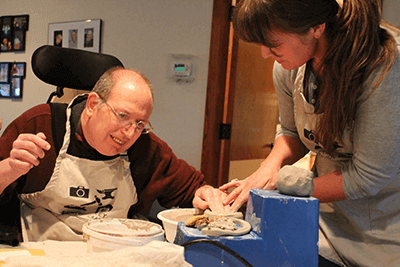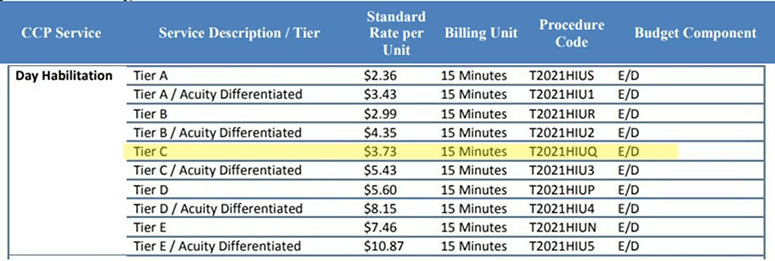DDD Programs Fund Services for Adults with Developmental Disabilities

Part Two: The Community Care Program
As a part of the New Jersey Department of Human Services, the Division of Developmental Disabilities (DDD) provides the public funding for services and supports that address the needs of New Jersey adults with developmental disabilities. DDD is in the process of rolling all of the services that they provide from their previous contract-based system into a Medicaid-based Fee-for-Service system. In order to be eligible for DDD funded services, all individuals enrolled in the DDD system of supports and services must now be Medicaid eligible. To be eligible for DDD services, an individual must also be a New Jersey resident and meet the criteria of having a developmental disability.
To apply for services, an individual* must complete the DDD Intake Application and provide the required supporting documentation. After this preliminary paperwork is reviewed, the individual will be referred to the Developmental Disabilities Planning Institute (DDPI) who will assist them with completing a NJCAT (NJ Comprehensive Assessment Tool). Information acquired through the completion of the NJCAT will determine the amount of funding received or “Tier” to which an individual will be assigned. After a review of all of the data, individuals will receive written notification of their eligibility for one of two programs – the Supports Program or the Community Care Program.
Although all eligible individuals 21 and over can receive services under the Supports Program, there is currently a waiting list for assignment to the Community Care Program. For information on waiting list requirements and procedures see Division Circular #8. To request to be added to the waiting list an individual must submit the Community Care Waiver Waiting List Request Form to the Community Care Program Waiting List Coordinator for their county (In Sussex County, the form should be sent to DDD at 100 Hamilton Square Plaza, 7th Floor, Paterson, NJ 07505. Individuals who are in the Priority Category (There are two categories – general and priority) of the waiting list should expect to receive an annual status update letter from DDD.
The Community Care Program
In 2017 the Community Care Waiver was folded into the Comprehensive Waiver (the Supports Program is in this waiver as well) which prompted the name change to the Community Care Program (CCP). (Medicaid “waivers” allow states to develop programs to serve individuals in their communities rather than in institutional or long-term care facilities) There was no change to the program other than the name. Individuals who have been receiving services under the Supports Program will already have a Support Coordinator. Individuals new to DDD services will need to select a Support Coordination Agency. Selecting a Support Coordination Agency – is a helpful booklet that may assist individuals with finding an agency that will best meet their needs. Once an agency is selected, a Support Coordinator will be assigned to the individual and is responsible for assisting them with planning and making necessary connections with services and resources. Formerly, DDD case managers were the primary link between individuals and DDD services. In this new system, Support Coordinators provide that vital link.
The Tier that the individual was assigned to after completing the NJCAT corresponds to a level of funding based on functional and support needs. This funding, or individual budget, will provide the resources that the individual can utilize when choosing or accessing services. The following chart shows the funding amounts available in the various tiers. Additional funding may be available for individuals needing extra support in order to pursue or engage in employment (Supported Employment).

Individuals in the Community Care Program have higher budget levels than individuals in the Supports Program. The higher budgets provide the resources necessary for many people to explore and access residential options. Please note that the CCP provides necessary resources for services such as more hours of direct (individual) support, day programs (day habilitation), supported employment, etc. (See below for specific services) It does not provide funding for the expenses related to the “residence” part of a residential option. In other words it does not pay for rent, utilities, food, insurance, or any of the other expenses of living in a group home, supported living situation, or other individualized arrangement (self-directed). The costs related to room and board are not a Medicaid allowable expense.
Through a partnership between the Department of Human Services and the New Jersey Home and Mortgage Finance Agency, the Supportive Housing Connection has been formed to offer housing vouchers to adults with developmental disabilities living in provider-supported housing or in their own homes (not the family home). Individuals on the CCP or the Supports Program are eligible for these vouchers. Individuals with a housing voucher will pay thirty percent of their income for rent and the voucher will cover the remainder of their fair market rent. If the individual is in provider based housing, the provider will probably require payment of an additional percentage of income to cover living expenses such as utilities and food. Self-directing individuals may need to access additional assistance with expenses from programs such as Universal Service Fund (USF) for electric, Low Income Home Energy Assistance Program (LIHEAP) for heating and cooling, and Supplemental Nutrition Assistance Program (SNAP) for food.
This is a huge departure from the previous system in which, individuals living in provider-based housing were required to pay a “Contribution to Care” of seventy-five percent of their monthly income to the State of New Jersey to cover all of their living expenses. The provider was then compensated by the state for providing a residential program. The previous system did not offer any residential assistance to individuals who chose to live in their own homes, although they could apply for often scarce housing state and federal housing vouchers. This change in residential services is a complicated one and a challenge for both individuals and providers to navigate.
Although the CCP budget cannot be used for room and board related expenses, it can be used for the following services:
- Assistive Technology
- Behavioral Supports
- Career Planning
- Cognitive Rehabilitation
- Community Inclusion Services
- Day Habilitation
- Environmental Modifications
- Good and Services
- Individual Supports
- Interpreter Services
- Natural Supports Training
- Occupational Therapy
- PERS
- Physical Therapy
- Prevocational Training
- Respite
- Speech, Language, and Hearing Therapy
- Support Employment
- Transportation
- Vehicle Modification
For more detailed information on these services, please refer to The Community Care Program Policies and Procedures Manual – Section 17l.
In the former system of services, providers were contracted to provide a service to a specific number of individuals in a program. In the Fee-for-Service system, the individual basically “purchases” a service from a provider or vendor at an established rate. The rate or cost of that service will need to fit within the parameters of the individual’s budget. Although, the Support Coordinator will work with each individual to determine how to best meet their needs with the funding available to them, it is helpful for individuals to have a basic understanding of the rate structure that affects and guides the use of all services.
Each of the services available in the Community Care Program (see list above) has a specific rate, unit, code, and budget component assigned to it. It sounds very complicated……and it is. Walking through an example of may help. We’ll look at an individual with a Tier of C attending a day program (called Day Habilitation now). Here are the specific rates, codes, etc. for the Day Habilitation service:

Looking at the columns in the chart:
- CCP Service refers to the specific service
- Service Description/Tier identifies the Tier A through Ea.
- Standard Rate per Unit is the approved amount that Medicaid will pay the provider for that service
- Billing Unit is the specific amount of time the rate pays for (15 minutes, daily, single, etc.)
- Procedure Code is the billing code that the provider uses to identify to Medicaid what service they provided. (This is like the billing codes your doctor uses to tell your insurance company what type of exam or procedure he provided for you.)
- Budget Component is the part of the budget that can be used to pay for this service. (If you refer back to the chart on Community Care Program Tiers, you’ll see that there are three funded components to each budget – Employment/Day, Individual/Family Support, and Individual Supports)
Looking at the chart, we can see that for an individual with a Tier of C, utilizing Day Habilitation, the provider will be paid $3.73 for every 15 minutes that the individual attends that program. And, those monies will be paid out of the “Employment/Day” component of the individual’s budget.
Not every Community Care Program service has a dollar amount rate specified. The rate for several services is noted as “R & C” or reasonable and customary. This allows the individual some flexibility when purchasing a service such as a Vehicle Modification or Assistive Technology. It also allows the individual to set the pay rate for a self-hired Direct Support Professional. There are some limitations and requirements associated with services that allow this flexibility in rate, and those details can be found in The Community Care Program Policies and Procedures Manual – Section 17.
The shift to a Fee-for-Service system represents a dramatic shift in thinking from the program- based system that has been around for so many years. Funding individuals instead of programs provides flexibility for the individual. However, it also requires that the individual be more involved, make more decisions, and have a more in depth knowledge of how the system works. With a general understanding of how Community Care Program budgets can be utilized, individuals will be able to frame realistic expectations of meeting support needs. Support Coordinators should be able to answer any questions that individuals have, advise on the most efficient and effective use of individual’s budgets, and provide information on additional resources. (An individual/family having difficulty working with their Support Coordinator should contact their Support Coordination Agency or request an agency change by submitting a Support Coordination Agency Selection Form.)
For additional information about the Community Care Program, individuals should contact the DDD Community Service Office that serves their county (In Sussex County, it’s the Flanders office, 973-927-2600). Or, questions on either the Community Care Program or the Supports Program can be directed to the Supports Program Help Desk: [email protected].
*For expediency, the term “individual” is used here. Many individuals will need the assistance of a family member or other authorized person to assist them with applying for, accessing, and managing services.



